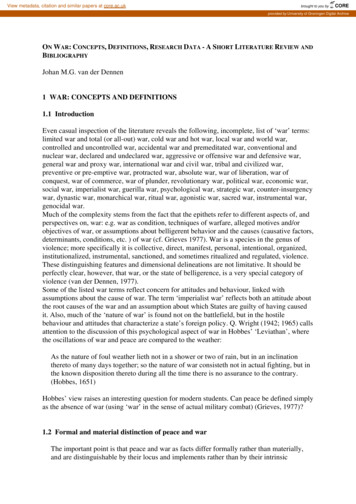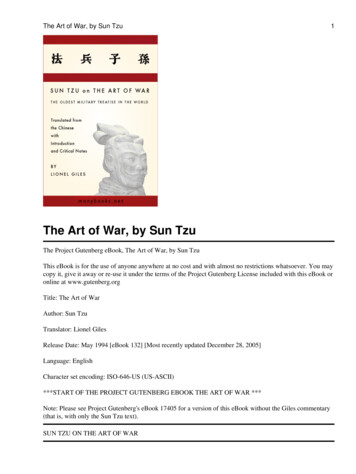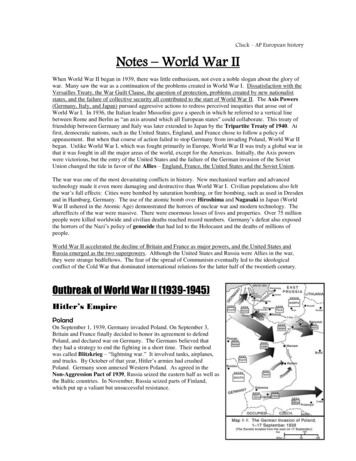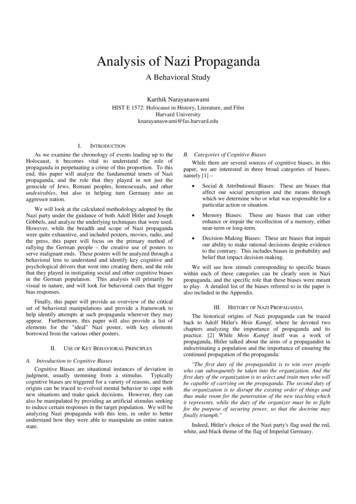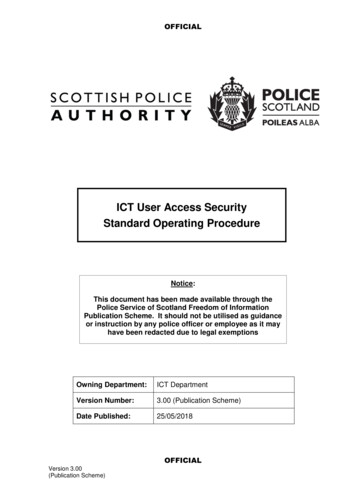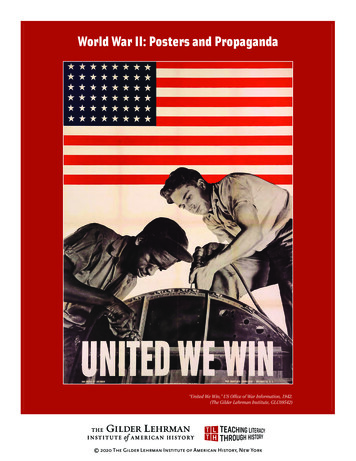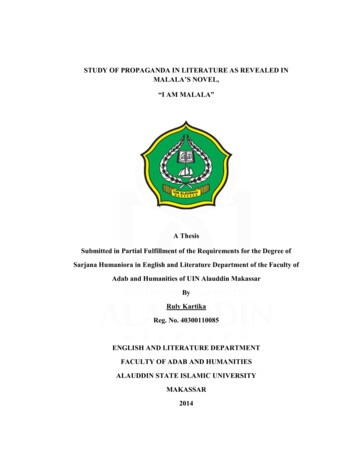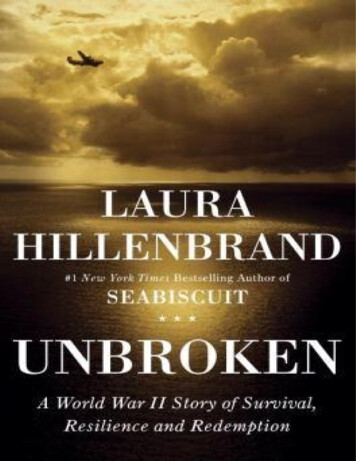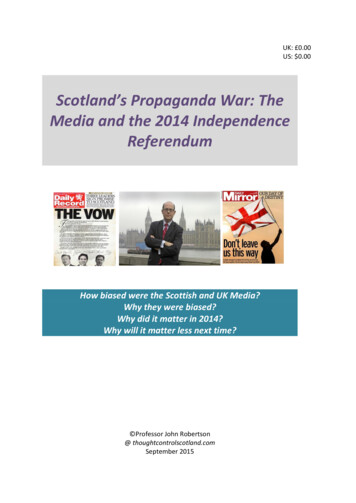
Transcription
UK: 0.00US: 0.00Scotland’s Propaganda War: TheMedia and the 2014 IndependenceReferendumHow biased were the Scottish and UK Media?Why they were biased?Why did it matter in 2014?Why will it matter less next time? Professor John Robertson@ thoughtcontrolscotland.comSeptember 2015
Professor John Robertson, of University of the West of Scotland, provides a detailedaccount of the role the Scottish and UK media played in the Scottish ReferendumCampaign. The book is based on his own research, which triggered a heated disputewith BBC Scotland, a summons to the Scottish Parliament and a storm of debate insocial media. It also presents research by other academics and gives explanations forthe findings from prominent theorists such as Noam Chomsky.Originally contracted to Welsh Academic Press in September 2014, the book is nowreleased into the public domain after several infuriating delays and barriers of aninexplicable nature.This account of media bias in the coverage of the Scottish Referendum campaign goesbeyond more journalistic impressions, from practitioners within the industry, toexplain why it was so. It does this by revealing the true nature of influences on ourmedia which are the result of unequal access to education and the interlocking of theresultant elites in finance, in ownership, in commercial directorships, in mediadirectorships, in senior post-holders in journalism, in university leadership includingprofessors, and, uniquely in Scotland, in the elites leading the Scottish and UK Labourparties.With love for Scotland and all its people and places - John Robertson, 24th August 2015.Scotland’s Propaganda War2 Page
Contents:PageIntroduction: The Scottish Independence Referendumand the Media5Evidence of Bias in the Scottish and UK Broadcast Coverage15Evidence of Bias in the Scottish and UK Press Coverage69Social Media in Scotland and the Yes/No Campaigns80Covering the Scottish Referendum: ‘What the PublicWanted’ or Propaganda?93Media Effects: How Much Were the Voters Influenced?131Scottish Politics and Media after September 2014,Creating a more Democratic Scotland?149Scotland’s Propaganda War3 Page
To BernadetteScotland’s Propaganda War4 Page
Chapter 1: Introduction: The Scottish Independence Referendumand the Media‘The establishment is a dirty, dangerous beast and the BBC is amouthpiece for that.’ (Ken Stott, Actor in the Radio Times, 30/11/14)‘How the media shafted the people of Scotland.’ (GeorgeMonbiot, The Guardian, 16/9/18)‘The leader of the Yes campaign has said he did not believe theBBC showed bias in its coverage of the independencereferendum.’ on Blair Jenkins, STV, 30/9/14)‘I’m not really laying this charge at BBC Scotland. I just thinkmetropolitan BBC has found this whole thing extraordinarilydifficult, to separate their own view of the world from their viewin reporting Scotland.’ (Alex Salmond, First Minister of Scotland,in the Independent, 14/9/14)It’s strange. The SNP leader and the Yes campaign’s chief executive hold back fromattacking BBC bias directly, while an English journalist (George Monbiot) names theguilty and a popular actor (Ken Stott of The Missing, BBC 1, 2014) punches as hard asScotland’s Propaganda War5 Page
he can against perceived collusion between the UK establishment and its formerlyrevered public service broadcaster. The story of Scotland’s first independencereferendum in 2014 and the UK and Scottish media is a complex, messy but fascinatingone.Why did the leaders of the Independence movement refrain from attacking whatothers saw as the primary manufacturer of their defeat? Why did an otherwisepolitically inactive actor, often employed by the BBC, in starring roles, burst withindignation and strike hard at the injustice he saw in the BBC’s coverage? Why was anintellectual English writer known for his environmentalism and human rights activismsufficiently moved to urge the Scots, a fairly affluent northern European people with abenign and fruitful environment, to break free from London?The following six chapters will answer the above and those questions posed on thefront cover, after the title, of this book by tackling these six important questions:1. What evidence was there of bias in theScottish and UK broadcast (TV and radio)coverage?2. What evidence was there of bias in theScottish and UK press coverage?3. What role did social media in Scotland playin the Yes/No campaigns?4. Was coverage of the Scottish Referendum,‘What the Public Wanted’ or Propaganda?5. How Much Were the Voters Influenced?Scotland’s Propaganda War6 Page
6. What will Scottish Politics and Mediabecome after September 2014? Will wecreate a more democratic Scotland?First, and only in this Chapter, there’s my personal experience as an academic whowalked unwittingly into a storm of media activity around the Scottish Referendum inFebruary 2014 and who changed almost instantly from a back-room researcher andteacher into one of the Yes campaign’s favourite professors and one of the mediaestablishment’s pariah figure. If you’ve heard it before or if you’re not that interestedin this kind of personal thing, skip to Chapter 2. To paraphrase the Grateful Dead (60’sacid/hippy band): ‘Lately, it occurs to me what a [not very] long strange trip it’s been.’On the 21st January, 2014, BBC Scotland’s Head of Policy and Corporate Affairs wroteto me to criticise severely my recent research report of imbalance and bias in TVcoverage of the Scottish Referendum debate in 2012/2013. He copied in my UniversityPrincipal on the basis of alerting the latter to damage to both institutions’ ‘corporateimage’:Dear Dr RobertsonI read with interest your report on BBC and STV news output, relative to thereporting of the Scottish referendum campaign.On the basis of the document, as published by the University of the West ofScotland (http://issuu.com/creative futur/docs/robertson2014fairnessinthefirstyear ),we have a number of serious concerns with the methodology applied, with thefactual accuracy of a significant number of the contentions contained within thereport and with the language used in the report itself.As it stands, many of the conclusions you draw are, on the evidence you provide,unsubstantiated and/or of questionable legitimacy.The BBC, as outlined within its Editorial Guidelines, is committed to accurate andimpartial reporting, a commitment that lies at the heart of the public service weScotland’s Propaganda War7 Page
offer to audiences. The independence referendum is the most importantconstitutional issue of recent times and our duty to provide fair and balancedreporting of that referendum is paramount.Based on what you have published, your report offers a highly subjective andquestionable analysis of our news output. Can I ask if you intend to publish thedata to which you refer in the report, given that the report itself contains nofootnotes or appendices to allow further analysis or consideration? Or, failingthat, would you supply the data to us to allow assessment of the informationwhich has underpinned your findings?I await your response.YoursThe above email was leaked online, by a colleague, leading to a flurry of internetactivity largely attacking the BBC. The scale of the internet phenomenon is difficult togauge accurately but insiders estimated that combined Facebook and Twitter activitymay have reached 250 000 messages by the end of January.By going straight to my Principal, the Head of Policy and Corporate Affairs hadbypassed my Head of School and then my Dean of Faculty. What had triggered him towrite in such aggressive terms and to report me to his employer is unclear though itmay be a simple consequence of the BBC’s charter which requires it to be impartial.For some at the BBC, the charter has long required impartiality and because of all theyears in which that impartiality has not been challenged, they have come to think of itas a given – we say we’re impartial so we must be impartial. At a later meeting of theHolyrood Education and Culture Committee, the Head of BBC Scotland admitted theyhad never carried out a similar investigation into any research study forwarded tothem. Based on rumour only, I must admit, there is a suggestion that a team ofScotland’s Propaganda War8 Page
graduate researchers, newly appointed to improve actual coverage of theReferendum, were ‘set on’ my report, told to watch every second I had covered and tofind errors. They found some. I had wrongly typed a date putting it out one day. I hadmistaken one BT leader for another. This kind of error amongst more than 600 hoursof transcripts is of course, unforgivable, if you’ve never done research before. Moreworrying at first sight for me, was their accusation that I had coded reports as beingabout the Referendum when, for the BBC, they were not. Most notable of these wasmy coding of Eleanor Bradford’s reports on the Scottish NHS containing, often,comparisons with an apparently superior English situation, as a negative for the Yescampaign. This literalist approach is the kind of reasoning popular in the very youngand amongst those older but otherwise already defeated.Though absent in mainstream media reporting, the research had received massiveinterest online and especially in Yes campaign blogs. Newsnetscotland.com reported10 000 hits in the first day. Online traffic referring to the research across blogs, newsagencies, Twitter and Facebook has been estimated at c250 000 messages. I receivedmore than 100 personal emails with most of these copied to my Principal and withpleas to take care of a researcher who would soon be engaged, they anticipated, in anunequal struggle. Within UWS, I received support at all levels for his academic right toask questions of power. Taken by surprise by this cyberstorm of messages, I was slowto notice a set of accompanying silences, throughout January, February and earlyMarch 2014, which once reflected upon were to form a greater daily presence andthen to a realization that I was to experience directly, thought control in a democracyfacilitated by behaviour patterns amongst elites and their dependent groups.Scotland’s Propaganda War9 Page
Dramatically, I was now to experience it in a country I had naively thought betterequipped to expose elite collusions than many others - Scotland.A telephone call from BBC 2’s Newsnight Scotland, on 23rd January 2014, made aprovisional offer of a place to debate my research. The caller clearly knew nothing ofthe complaint. Later in the day the offer was withdrawn with no explanation. Thissuggested editorial interference of a kind banned by the BBC’s own standards. As faras I can see it was the first example since the BBC top brass cancelled a NewsnightSpecial on Jimmy Savile as it would have negatively affected another higher profilebroadcast celebrating 1970’s BBC celebrities including the soon to be publicallyannounced multiple rapist’s charity work. The same day an offer to speak on RadioScotland arrived. On Saturday 25th January, around 8am, for 8 minutes, I wasinterviewed on Radio Scotland, for eight minutes, by a friendly interviewer whoseemed to know little of the research. The broadcast was kept on the BBC site for afew days then withdrawn. It is still available on YouTube. The interview triggered afurther flurry of online activity.On 5th February, Early Day Motion 1052 was tabled to the UK House of Commonsrequesting: ‘That this House encourages the BBC and other television broadcastersnamed in the interim report by Dr John Robertson of the University of the West ofScotland, titled, Fairness in the First Year?, about political balance in broadcasting to atleast cover the report on television so that viewers may be informed about views andconcerns on the broadcasting balance and impartiality in the run up to the ScottishIndependence referendum on 18 September 2014’. The BBC reported on neither themotion nor the research. Since then two of my younger UWS colleagues have reportedScotland’s Propaganda War10 P a g e
being warned to disassociate themselves from me, during visits to BBC HQ. Theycannot be identified obviously.On 21st February, Professor Roy Greenslade, in his Guardian blog, summarised myresearch. There were 206 comments by readers of which 197 can be read as critical ofthe BBC. By 23rd February, however, Greenslade had published a response entirelyfrom the BBC perspective and casting doubt on the integrity of the research. Therewere 42 comments from readers of which 37 were again critical of the BBC but alsomany were critical of Greenslade’s apparent willingness to submit to BBC pressure.Then, with only two days’ notice, I was asked to give evidence, to the ScottishParliament’s Education & Culture Committee, on March 11th. Subsequent to thistelevised event, all of the mainstream Scottish press and STV but not BBC, reported onthe evidence and one, only, prominent academic of the left sent a personal email ofsympathy. The BBC remained silent despite their actual presence at the samecommittee and in the face of attempts by callers to radio debates and audiencemembers on TV debate to raise the ‘UWS study’. At the Scottish GovernmentCommittee, the BBC chiefs made clear that they did not count and categorisecomplaints nor would they in the future, as their attendance at a Scottish GovernmentCommittee had only been a temporary ‘politeness’ pressed upon them by BBC HQ inLondon.Scotland’s Propaganda War11 P a g e
Another piece of evidence of the widespread anti-independence bias in Scottish elitesarrived in August. I was invited to speak at the 5 Million Questions conference atDundee University on 13/14 September. After sending my outline, I received this:Scotland’s Propaganda War12 P a g e
Dear John,Thank you for sending your title and blurb. We were wondering if wecould edit the second last sentence slightly, to read "What, on the basis ofmedia coverage, seems to have been the experience of academics inScotland, during the current referendum?”It is just because Prof Chris Whatley chairs the 5MQ steering group andwe’d like to be mindful of that situation. I hope this is ok?I was being asked to change the content of my presentation to accommodate thefeelings of the host! Professor Whatley had been criticised by an SNP minister and innumerous mainstream media reports characterised as evidence of Scottishgovernment bullying of academics. When I refused to change my summary to includeWhatley in my experience, they suggested moving me from the Saturday (main event)to the Sunday. I refused that and wrote this below:On reflection, I wish to withdraw. My reasons are below:1. I question Professor Whatley’s impartiality and therefore suitabilityto chair your steering group.2. I believe your request that I change my content, reflects pressurefrom Professor Whatley, constrains freedom of speech and,insultingly, attempts to equate his experience with mine (see belowfor detail).3. I believe your suggestion that I now move to the Sunday is anattempt to hide my views or to avoid critical debate that mightembarrass Professor Whatley.Scotland’s Propaganda War13 P a g e
Professor Robertson’s experience:1. Reported to his employer for bringing his university and the BBCinto corporate disrepute.2. His research fully suppressed by the mainstream media includingthe BBC.3. An absence of support from his peer group and this ignored.4. Producing findings unwelcome to the unionist hegemony in theScottish HE and Media establishment.5. Emerging from a ‘new’ university not familiar to the members of theHE and Media professionals elites.Professor Whatley’s Experience:1. Reported to his employer, not by a powerful media institutioncapable of massive influence, but by a single minister in anadministration powerless to defend itself against unionistmainstream media bias.2. His comments widely disseminated and supported in themainstream media.3. Strong support from his peers and this reported widely.4. Producing ideas utterly complicit with the unionist hegemony in theScottish HE and Media establishment.5. Emerging from an ‘old’ university familiar to the members of the HEand Media professional elites.Here’s a link to Prof Whatley’s ‘bullying’ to-gag-university-academics.htmlWell, that’s enough of me but, in my defence, my experience has much in commonwith that of the Yes Campaign as a whole. For more specific details, read on.Scotland’s Propaganda War14 P a g e
Chapter 2: Evidence of Bias in the Scottish and UK BroadcastCoverageAcademic blasts coverage of research intoreferendum 'media bias'An academic who released research claiming "evidence of bias" in STV andBBC coverage of the referendum has hit out at the media for ignoring his work.Professor John Robertson of the University of the West of Scotland said therehad been collusion among Scotland's mainstream media and he condemnedfellow academics for not supporting his work, saying it amounted to "thoughtcontrol" in a um-media-bias/Figure 1: STV News: Tuesday 12th March 2014‘The BBC, as outlined within its Editorial Guidelines, is committed toaccurate and impartial reporting, a commitment that lies at the heart of thepublic service we offer to audiences. The independence referendum is themost important constitutional issue of recent times and our duty to providefair and balanced reporting of that referendum is paramount.’ (From theHead of Policy and Corporate Affairs, BBC Scotland, in an email to me, inJanuary 2014).Scotland’s Propaganda War15 P a g e
‘Not since Iraq have I seen BBC News working at propaganda strength likethis. So glad I’m out of there.’ Paul Mason (former BBC Economics Editor, inthe Spectator 12th September 2014).‘The most effective propaganda is found not in the Sun or on Fox News butbeneath a liberal halo’. John Pilger in counterpunch, 5th December 2014.The BBC has ‘previous’ as law-enforcers say. In September 2012, Oliver Huitsonreported on the BBC’s coverage of the NHS Reform Bill and concluded:‘In the two years building up to the government’s NHS reform bill, the BBCappears to have categorically failed to uphold its remit of impartiality, parrotinggovernment spin as uncontested fact, whilst reporting only a narrow, shallowview of opposition to the bill. In addition, key news appears to have beencensored. The following in-depth investigation provides a shocking testimony ofthe extent to which the BBC abandoned the NHS.’ (Huitson, 2012)The notion that the BBC’s impartiality could not be taken for granted and that it wascomplicit in the government’s undermining of the NHS, still shocks. For many peoplethe BBC remains a trusted institution by contrast with, say, political parties,corporations or newspapers. Needless to say, this research attracted little mediaattention, none from the BBC itself, and only the stock response that the BBC wasimpartial in all matters so the research must be flawed. Huitson’s experience was soonto be repeated for me.Scotland’s Propaganda War16 P a g e
From September 2012 to September 2013, I carried out a year-long content analysis ofevening news (6-7pm on both BBC and ITV). In February 2014, I reviewed the coveragein the light of an my, and the BBC’s, attendance at a Scottish Government committee.In April 2014, I did a one- month intensive (6 days a week) study of BBC Scotland’sextended ‘flagship’ politics show, Good Morning Scotland. Then in August, I brieflytackled the difficult are of bias by omission. Finally, I did two one-day studies of BBCcoverage of two key events just before and just after the vote in September.The results of these studies are presented here but attempts to explain why they areas they are, is reserved for a later chapter on the nature of propaganda.Fairness was my chosen concept from the start. Fairness is aspirational. Perfectbalance or perfect impartiality is not attainable. Fairness requires only the continuingapplication of reflective and consistent methods to maximise the levels, within singlebroadcasts and over longer periods. The crude numerical balance of quantities ofstatements identifiable as supportive of different sides in a debate is reasonablyimportant but less so than other factors. When broadcasts begin too often with badnews for one side this is unfair. Where one side commonly leads off while the otherhas to react, this is unfair. Where bad news is repeated with high frequency in onebroadcast, this is unfair. Where interviewers are not consistent in their approachesregarding tone, difficulty or tendency to interrupt, this is unfair. Where witnesses ofclear bias or incompetence or where evidence of dubious validity are used to supportone side consistently against the other, this is unfair, unprofessional and perhapscorrupt. Where there is no procedure at editorial level to monitor fairness withinScotland’s Propaganda War17 P a g e
single broadcasts and over longer periods, this is, similarly, unfair, unprofessional and,is perhaps, corrupt.Fairness in the First Year? BBC and ITV Coverage of the Scottish Referendum Campaignfrom September 2012 to September 2013The ‘Phase 1’ survey of TV coverage of the referendum campaigns covers the periodfrom 17th September 2012 to 18th September 2013 including every weekday evening(6-7pm) broadcast by BBC 1, Reporting Scotland, ITV and STV, and shorter weekendbroadcasts in that period. A total, therefore, of approximately 640 hours, minusadvertising breaks in ITV and STV broadcasts, was watched, transcribed and coded.The evening TV broadcasts were chosen as the news media communications with thelargest audiences in Scotland and in the UK. The distribution and quantity of messagesof different types is presented in a tabular format with selected text examples toillustrate types of message.The key questions:1. How prevalent were referendum topics in the first year of the campaigns?2. What was the relative balance of statements given to the views of Yes and No,representatives, arguments and evidence?3. What was the relative balance of independent, scientific or academic evidencepresented in support on the Yes and No campaigns?4. To what extent did No arguments precede the Yes and vice versa?Scotland’s Propaganda War18 P a g e
5. What was the ratio of arguments finishing broadcasts unchallenged in favour ofthe Yes and No campaigns?6. To what extent were arguments equated with the apparently personal wishesof political personalities rather than as collective positions?7. What was the relative balance of offensive statements made to Yes and Nocampaigners and broadcast?8. What forms of evidence dominated the discourse – economic, political orsocial?9. Overall and to what extent, did reporting favour the Yes or No campaign.Methods:A content analysis of the relative presence of types of political message containedwithin broadcasts in the first year of the Scottish Independence Referendumcampaigns applied the coding categories in the table below. More detail for thoseinterested in methods can be found in the original version in the chapter bibliography).Results:Scotland’s Propaganda War19 P a g e
CodeRepScSTVBBC114114151ITV RepSc BBC111STV ITV152824Pro-Ind/Sci/Acad Evidence4700Anti-Ind/Sci/Acad Evidence222010Anti-Pro Order6661131Pro-Anti Order2453193Personalisation of ideas as AS2832720000Abusive of Pro-independence figures181810Abusive of Anti-independence figures3300Economic evidence382393Social evidence181070Political evidence149152Finishing with Pro evidence unchallenged81720Finishing with Anti evidence 104078979320531994ReportsAbout/ Descriptive8579243Pro-independence/ SNP171172407Anti-independence/ SNP2622555510Personalisation of ideas as BT individualsCoded items8217926572062563401832610111734Table 1: Number of statements for each coded categoryNews reports relating to the referendum were fairly regular occurrences on the twoScottish channels over the twelve months. In sharp contrast the UK-wide broadcastsrarely reported on this topic. The BBC1 figures are inflated by the Reporting Scotlandheadline alerts which followed the ‘national’ headlines and which were only seen inScotland. This apparent disinterest in a major constitutional challenge to the veryexistence of the UK, by its two dominant news programmes, is the first observation tobe taken from the above data.The simple numerical preponderance of anti-independence statements over proindependence statements by a ratio of c3:2 on Reporting Scotland and on STV, is alsoclear. One obvious explanation lies in the editorial decision to allow all three antiindependence parties to respond to each SNP statement creating an unavoidableScotland’s Propaganda War20 P a g e
predominance of statements from the former even when these were kept short. Antiindependence statements were heavily concentrated on economic affairs such asalleged increased unemployment or closures after independence, such as:o On 20/5/13 in STV at 6, the presenter announced ‘Scots’ saversand financial institutions might be at risk if country votes forindependenceo On 29/10/12 in Reporting Scotland, an extensive piece on Tridentand on Scotland’s defence forces after independence offers somespace for SNP response but is driven by a weight of one-sided andunchallenged evidence and commentary – unnamed economicadvisers are allowed to suggest 6500 jobs lost if Trident goes andan overall cost of 20bn while the report finishes ominously with‘Whitehall could play hardball’.o On 11/12/12, in Reporting Scotland, the programme opens with‘Row over independence could lead to higher electricity bills’ thenruns through a series of negative sound bites interspersed withSNP protest – ‘questions mount over independence’, ‘UKgovernment claims cost could rise’, ‘Could Scots customers haveto pay more?’, ‘Labour spokesman – danger’ before allowing theevidence of Scottish over-production, renewables and a captivemarket in England to cast serious doubt on the motivation for theinitial headline ‘scare’.Scotland’s Propaganda War21 P a g e
Health-related matters were the other dominant theme. For example, on 27/9/12 thecase of a Scottish patient seeking free care only available in England was highlightedand linked to the relative lack of GP control in Scotland. This began a mini-series ofreports that day on alleged failings in the Scottish NHS by Reporting Scotland reportersand by Labour spokespersons. No balancing cases were reported of a flow in the otherdirection although such did appear in the popular press (‘Now English asthma patientsare denied life-changing drug offered to Scots’, Daily Mail, 9/11/12). The use of singlecases to suggest wider concerns is of course problematic.Less typical but of interest in this evaluation of editorial decision making was:o On 24/6/13 in STV at 6, the presenter, referring to a report fromthe ‘Scottish Institute’ offers unchallenged the notion that theScottish armed forces ‘might have trouble recruiting due to lack ofadventure’! The possibility of the reverse trend is not considered.The use of evidence from sources other than the parties themselves and which mightbe presented as ‘independent’, ‘academic’ or ‘scientific’ is a measure of quality inpolitical debate. Notably, there was very little use of such evidence in the reportingoverall and, where there was, there was clear tendency to use anti-independence overpro-independence evidence. Though a rare phenomenon overall, reporting tended tolink pro-independence evidence from Scottish Government sponsored committees totheir sponsorship while UK advisory groups such as the Office for BudgetResponsibility, The Institute for Fiscal Studies and several Parliamentary, Treasury, orScotland’s Propaganda War22 P a g e
House of Lords committees were typically treated as independent despite linkages toUK government and other government departments or units with a vested interest inthe union. Indeed the IFS was referred to as a ‘well-respected think tank’ (ReportingScotland, 19/11/12) whereas a Glasgow University academic was ‘outed’ as havingbeen ‘bought’ by the Yes campaign to support the independence case (ReportingScotland, 22/8/13).The sequence of statements whereby anti-independence arguments preceded proindependence responses as opposed to the reverse order is of interest. There was aclear majority (66:24) of the former, on Reporting Scotland where ‘bad news’ aboutindependence came first and obliged a defensive response from a pro-independencespokesperson but a much narrower majority (61:53) on STV News. The ReportingScotland imbalance tends to normalise the No/anti-independence position and put theonus of the Yes/pro-independence position to justify itself.Personalisation of political issues is long-established strategy to weaken arguments,shifting focus from collective reasoning or shared values to supposed personal desiresand personality traits. Historically, this tendency or strategy has been used todemonise and to undermine numerous political figures in the UK including MichaelFoot and Neil Kinnock. In the above data, the repeated association of the Yes/proindependence campaign with the personal desires of Alex Salmond was regular andfrequent. No such equation between No/anti-independence figures’ personal drivesand the No campaign was made. Likewise the broadcasting of personally insultingcomments by anti-independence representatives (especially Johann Lamont) aimed atScotland’s Propaganda War23 P a g e
Alex Salmond, almost entirely, was predominant though a few counter-jibes bySalmond against Lamont and the Labour Party did also occur. Notably the use ofinsults aimed at Salmond declined and had become less common in the second sixmonths of the survey. The tendency by oppositio
Scotland’s Propaganda War 5 P a g e Chapter 1: Introduction: The Scottish Independence Referendum and the Media The establishment is a dirty, dangerous beast and the is a mouthpiece for that. (Ken Stott, Actor in the Radio Times
